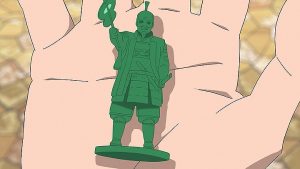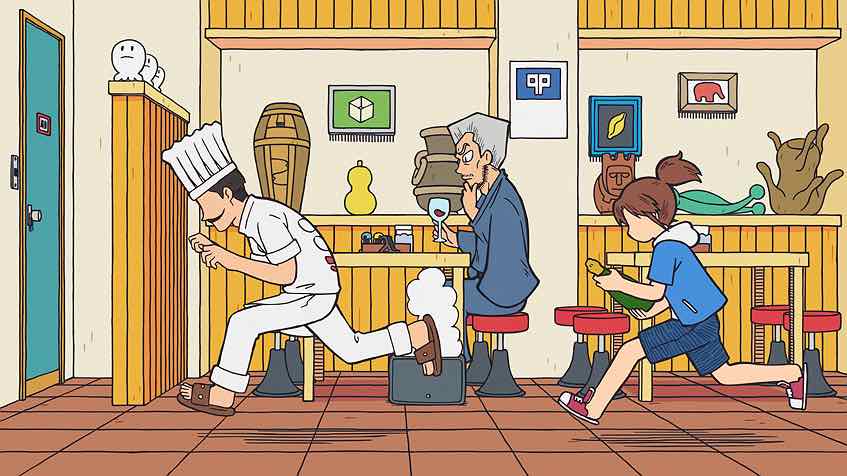 The thing about make a genre show – or a genre film – is that for it to work, you really have to understand the genre you’re paying homage to on the molecular level. Like, film school geek level. And sometimes when anime does Western genre material, it seems like the understanding is superficial. There are exceptions – Watanabe Shinichirou obviously, though he’s gotten pretty lazy in his later career. When he takes on a genre, he gronks it in a very deep way. 91 Days is another good recent example – a very specific Hollywood genre, and very spiritually faithful to it.
The thing about make a genre show – or a genre film – is that for it to work, you really have to understand the genre you’re paying homage to on the molecular level. Like, film school geek level. And sometimes when anime does Western genre material, it seems like the understanding is superficial. There are exceptions – Watanabe Shinichirou obviously, though he’s gotten pretty lazy in his later career. When he takes on a genre, he gronks it in a very deep way. 91 Days is another good recent example – a very specific Hollywood genre, and very spiritually faithful to it.
 It’s only three episodes, but Great Pretender really seems to understand what it’s paying homage to. You can tell from right the OP, which so perfectly captures the flavor of a 70’s caper film, that this series just gets it. It doesn’t hurt that it obviously has a huge budget by anime standards, which is ample reason to welcome Netflix’ involvement. Part of me still rebels against watching anime this way – I like looking forward to my one episode a week – and I lament that a show this good loses a lot of its Western audience because of the distribution. But you sure as hell can’t argue with the end product.
It’s only three episodes, but Great Pretender really seems to understand what it’s paying homage to. You can tell from right the OP, which so perfectly captures the flavor of a 70’s caper film, that this series just gets it. It doesn’t hurt that it obviously has a huge budget by anime standards, which is ample reason to welcome Netflix’ involvement. Part of me still rebels against watching anime this way – I like looking forward to my one episode a week – and I lament that a show this good loses a lot of its Western audience because of the distribution. But you sure as hell can’t argue with the end product.
 These two episodes are both excellent, though #3 is the real standout for me. There’s a lot of timeskipping here, part of some very well-executed exposition for Makoto especially. Turns out he was a kid who wanted to try and do right by his dying mother, and while we never do find out exactly what his father did it was obviously criminal and pretty serious. But people in Makoto’s situation seem to have a way of attracting trouble to them, and he gets taken in by Kudou-san (this was long before he was bought by Laurent) as part of a scam health product called “Jubilantea” (you know Makoto isn’t in on it because he gives some to his mother). And for a son of a con man with a felony on his record, Japan has got to be a pretty tough place to get ahead.
These two episodes are both excellent, though #3 is the real standout for me. There’s a lot of timeskipping here, part of some very well-executed exposition for Makoto especially. Turns out he was a kid who wanted to try and do right by his dying mother, and while we never do find out exactly what his father did it was obviously criminal and pretty serious. But people in Makoto’s situation seem to have a way of attracting trouble to them, and he gets taken in by Kudou-san (this was long before he was bought by Laurent) as part of a scam health product called “Jubilantea” (you know Makoto isn’t in on it because he gives some to his mother). And for a son of a con man with a felony on his record, Japan has got to be a pretty tough place to get ahead.
 Back in the present, Makoto proves himself to be a little more than the pliant greenhorn Laurent takes him for. After a scenic (with a very red sunset) dinner at Gladstone’s in Malibu (Makoto tries to fob the check off on an innocent bystander but Laurent says he only steals from those who deserve it), the two of them and Abby (Fujiwara Natsumi, who I absolutely did not recognize) retire back to a hotel before Laurent leaves Abby to watch (at least) Makoto. She promptly lets him walk (though not before almost strangling him), and that’s when things start to get really crazy.
Back in the present, Makoto proves himself to be a little more than the pliant greenhorn Laurent takes him for. After a scenic (with a very red sunset) dinner at Gladstone’s in Malibu (Makoto tries to fob the check off on an innocent bystander but Laurent says he only steals from those who deserve it), the two of them and Abby (Fujiwara Natsumi, who I absolutely did not recognize) retire back to a hotel before Laurent leaves Abby to watch (at least) Makoto. She promptly lets him walk (though not before almost strangling him), and that’s when things start to get really crazy.
 Makoto was ready to bail – though we don’t find that out til later – but Abby was right, Eddie’s goons were watching LAX. He makes a silk purse of a sow’s ear though, talking his way into a $10 million payout instead of $5 million. And now we find out he didn’t try to bail after all, he just wanted to make Eddie think he had. And he’s cooked up a plausible-looking recipe for Sakura Magic, which is the key to doubling the fee – if Eddie can cook it himself, it obviously opens a lot more doors up to him. Of course Sakura Magic is a scam to begin with and Makoto’s initial freak-out after “taking” it was apparently psychosomatic, but Eddie doesn’t know that.
Makoto was ready to bail – though we don’t find that out til later – but Abby was right, Eddie’s goons were watching LAX. He makes a silk purse of a sow’s ear though, talking his way into a $10 million payout instead of $5 million. And now we find out he didn’t try to bail after all, he just wanted to make Eddie think he had. And he’s cooked up a plausible-looking recipe for Sakura Magic, which is the key to doubling the fee – if Eddie can cook it himself, it obviously opens a lot more doors up to him. Of course Sakura Magic is a scam to begin with and Makoto’s initial freak-out after “taking” it was apparently psychosomatic, but Eddie doesn’t know that.
 It would be easy at this point to write Eddie off as a lowlife Philistine, but – and the story is a lot more interesting for it – he turns out to be a pretty smart operator himself. Maybe there’s a genuine aspect to his delight in the way Makoto praises his B movies (how great was Ohtsuka Akio as Razzie, seriously) but he’s not giving away $10 million without doing some homework. Eddie is a surprisingly careful guy – he’s even got the LAPD in the bag, courtesy of Chief Anderson (Tani Atsuki). But Laurent is a pretty careful guy too, and you get the sense that these are two men who didn’t get as far as they did in their respective nefarious vocations by accident.
It would be easy at this point to write Eddie off as a lowlife Philistine, but – and the story is a lot more interesting for it – he turns out to be a pretty smart operator himself. Maybe there’s a genuine aspect to his delight in the way Makoto praises his B movies (how great was Ohtsuka Akio as Razzie, seriously) but he’s not giving away $10 million without doing some homework. Eddie is a surprisingly careful guy – he’s even got the LAPD in the bag, courtesy of Chief Anderson (Tani Atsuki). But Laurent is a pretty careful guy too, and you get the sense that these are two men who didn’t get as far as they did in their respective nefarious vocations by accident.
 It’s not as if all this is anything expressly new, exactly, but it feels much more like a Hollywood film than anything I’ve seen in anime. There are just enough Japanese touches (like Makoto’s idolizing Hideyoshi Toyotomi, which tells us so much about him) to give the dish a little seasoning, but this is so in-the-know that I’m kind of amazed it’s actually Japanese. I mean, there’s a lot of L.A. minutiae and humor here that’s really spot-on, and the cat-and-mouse between the various players in this operation is extremely engaging.
It’s not as if all this is anything expressly new, exactly, but it feels much more like a Hollywood film than anything I’ve seen in anime. There are just enough Japanese touches (like Makoto’s idolizing Hideyoshi Toyotomi, which tells us so much about him) to give the dish a little seasoning, but this is so in-the-know that I’m kind of amazed it’s actually Japanese. I mean, there’s a lot of L.A. minutiae and humor here that’s really spot-on, and the cat-and-mouse between the various players in this operation is extremely engaging.
 The frosting on top is the look and sound of the series, which is partly due to that Netflix money to be sure – the chase scene (those taillights!) was gloriously lavish and beautifully choreographed. Then you have Sadamoto’s faces and Takeda’s backgrounds, which mesh perfectly. And the OP and ED are so in-synch with the series itself that they feel like part of the narrative no matter how many times you see them. The sense with Great Pretender is that of a series where everything just clicks – the right people in the right jobs given the tools to do those jobs as well as they possibly can. That’s rare in anime or any other medium, and it really feels like the first time Netflix’ potential as a partner for anime is being fully utilized.
The frosting on top is the look and sound of the series, which is partly due to that Netflix money to be sure – the chase scene (those taillights!) was gloriously lavish and beautifully choreographed. Then you have Sadamoto’s faces and Takeda’s backgrounds, which mesh perfectly. And the OP and ED are so in-synch with the series itself that they feel like part of the narrative no matter how many times you see them. The sense with Great Pretender is that of a series where everything just clicks – the right people in the right jobs given the tools to do those jobs as well as they possibly can. That’s rare in anime or any other medium, and it really feels like the first time Netflix’ potential as a partner for anime is being fully utilized.


















































Dauntingoverlord
June 10, 2020 at 5:36 amJust finished watching episode 3. This has been a lot of fun so far. Die Hot is a masterpiece of modern storytelling. If the show continues with this quality, I’m going to have a good time.